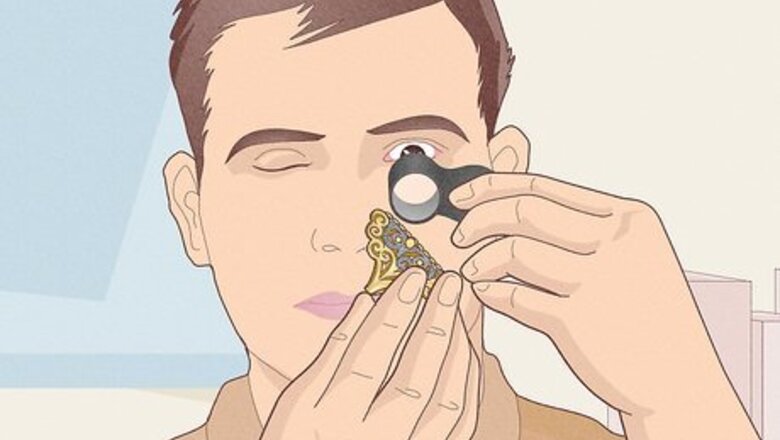
views
Where to Sell Gold Jewelry for Cash
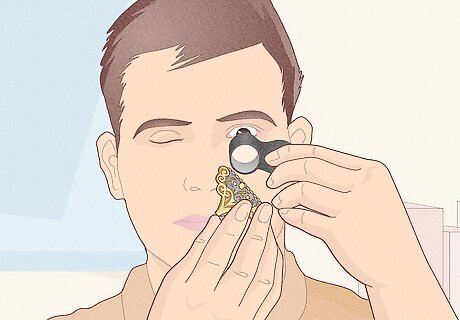
Get an offer from a jeweler for a safe, convenient option. This is a quick way to make a deal in person and walk away with cash, but you may not get as much money from a jewelry store as you would if you chose to sell to a gold buyer. They also don't have calibrated scales checked by the Weights and Measures Division, which means they might not calculate payment accurately. Lastly, a jeweler might try to convince and pressure you to purchase an item in their store, even if you’re only trying to sell your jewelry. To make sure they’re reputable, check out your local jeweler’s credentials online. See if they’re part of a trade group like the American Gem Society, Jewelers of America, the GIA, or the Jewelers Vigilance Committee. Then, look the business up with the Better Business Bureau (BBB) and check out online reviews. Shop around. Always get multiple quotes before selling your jewelry. Some stores may offer lower prices than others, depending on how much of a cut they take and whether they can recognize special pieces.

Go to a pawnshop to get cash fast. The positive side of pawnshops is that you can walk out the door with cash in hand within 10 minutes. The downside is that pawnshops rarely have the equipment to properly measure gold, and they won’t give you the best price. It’s best to avoid this option and shop around a little more, unless you’re pressed for time and need cash right away.
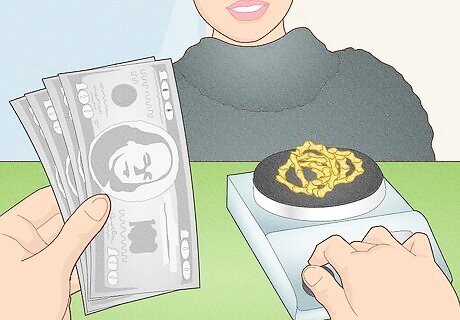
Sell to a gold buyer for the best price. Find a local gold buyer by checking online reviews and searching for the business in the BBB directory. Their scales are calibrated by the official Weights and Measures Division to ensure you have a fair and accurate reading. Buying gold is their only business, so unlike jewelry stores, they aren’t motivated to sell you another piece of jewelry. Gold buyers are typically licensed by the Department of Justice as well as with their local police departments to help recover any stolen gold they encounter. Avoid “hotel buyer” scams. These companies come in for 1 day only to try to buy gold as cheaply as possible and take advantage of customers. Trust a company that at least has a presence in your local community with a good reputation.
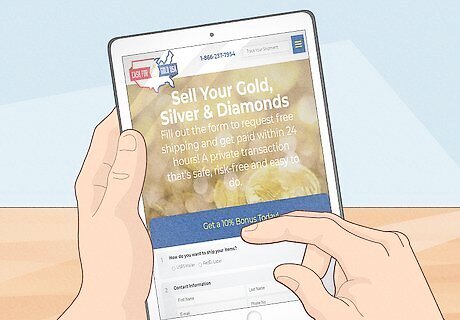
Sell to a reputable gold-buying website for a fair, easy option. Online gold buyers will pay you in the form of a check or wire transfer. All you have to do is pack your jewelry with the insured shipping label they send and wait for your payment. CashforGoldUSA.com is considered one of the most reputable sites, and they’ll pay you within 24 hours of receiving the envelope. If you’re also selling gold coins, visit GoldBroker.com or American Bullion. Selling online often gets you the best price because it’s more economical to run an online business than brick-and-mortar locations. Online buyers have lower operating costs so they can afford to take a lower margin on products they buy and sell. Find out how long you have to evaluate the offer and see if the company allows you to return the money in exchange for your jewelry if you’re unhappy with the offer. Some may charge a small fee for appraisal and return shipping. Only mail your gold in an insured package with tracking. As with brick-and-mortar businesses, look up the gold-buying service in the BBB or through the Jewelers Vigilance Committee website.
Getting the Best Price for Gold Jewelry
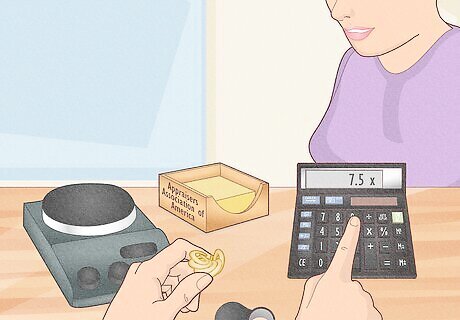
Get an assessment from a gold appraiser. Find an appraiser through organizations such as the ASA, the National Association of Jewelry Appraisers, or the Appraisers Association of America. Appraisers who belong to these organizations must abide by a strict code of conduct and ethics and will be fully honest when giving you a price estimate. You will have to pay a fee, but some appraisers charge as little as $20 for an assessment. In addition to giving you a price for the gold, an appraiser can tell you if your piece has intrinsic value beyond the gold weight and if the gems are real.
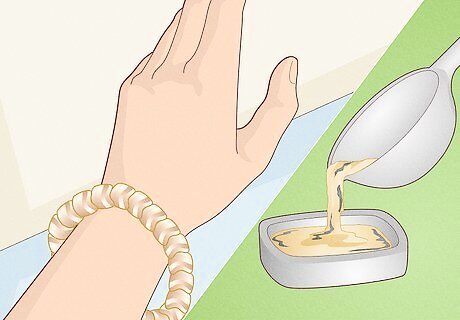
Determine if your gold is worth more than just melt value. Most gold jewelry gets melted down when it’s sold, and you should expect to be paid about 70-80% of the melt value. That difference is due to the buyer’s cut of the profits and the cost of melting down the piece. If your jewelry is a designer piece (like Cartier or Tiffany’s) or an antique piece, expect more than 80% of the melt value. If anyone offers you scrap gold prices for a designer piece, don’t accept the deal. A good point of reference a gold buyer uses is "What will it cost to remake this item brand new?" They won’t pay much over the melt price unless it's a very intricate piece. Designer pieces will be compared to other designer pieces that have been sold on sites like eBay and Worthpoint. When you look at the selling price, remember that these sites take a cut between 10-15%.
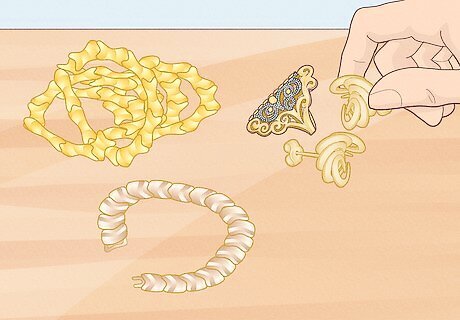
Sort your gold by purity. By organizing your gold before your visit, you’ll save yourself and the gold dealer time. Use a magnifier to check the little labels on the gold for "10k," 14k," and so on. This number refers to the karat, which tells the percentage of the gold piece that is pure gold. The higher the number (up to 24k), the purer the gold. Separate the jewelry by karat, and then place the jewelry into separate bags or containers. In other words, the proportion of the metals in your jewelry will add up to 24. If you have 14k gold, it means the piece is made of 14 parts gold and 10 parts other metals. Remove as many of your items in your collection that are imitation gold. The best way to tell if gold is real is with a strong magnet. Anything that sticks to the magnet is very likely not solid gold, and you shouldn’t include it when you bring your gold to a buyer. Another way to test your gold is by using bleach. Make a small scratch on your jewelry and add a drop of bleach. If it changes color, your jewelry isn’t 24k gold.
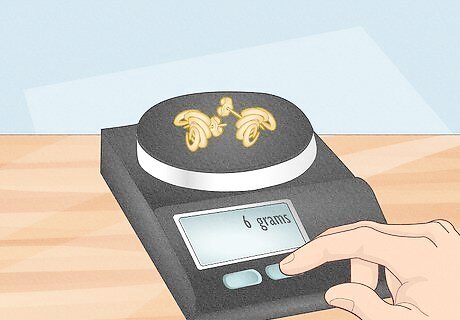
Measure the weight of your gold. It’s easiest to measure in grams, plus the price of gold is often listed as the price per gram. However, many gold buyers will use a special weight system called a pennyweight or a troy ounce. If they use a different measurement, just make sure you get paid by the right unit. For instance, if they measure by the pennyweight but pay you by the gram, you’re getting ripped off. Use the conversions below to double-check that you and your buyer are weighing your gold the same: 1/20th of a troy ounce is 1 pennyweight. 1 ounce is 0.911 troy ounces. 1 troy ounce is 31.1035 grams. It’s always smart to weigh your gold yourself before taking it to a buyer. Use a kitchen or postal scale to get a reasonable estimate of the weight.
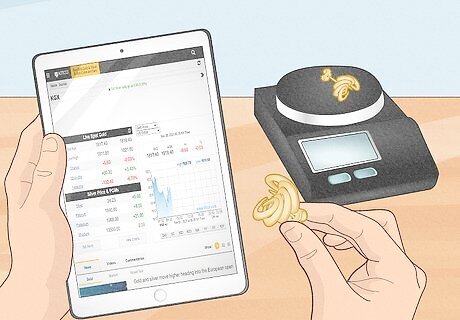
Calculate how much you’ll get when you sell your gold. To find the current gold price, visit https://www.kitco.com. The price that a gold buyer will give you for your jewelry is based on the price of gold for that day. However, keep in mind that price is based on 24-karat gold, which is 100% pure. To find the price for your piece, multiply the price of gold for that day by the percentage of your gold’s purity (check out common percentages below). Then multiply that number by your gold’s weight in grams. Many websites also offer a gold price calculator. 10 karat gold has 41.7% gold content, 14 karat has 58.5% gold content, 18 karat has 75% gold content, and 24 karat is pure gold. For example, if you have a 14k gold chain, "14k" means it’s 58.5% pure. Calculate the price based on the purity: If the price per gram that day is $57.44 per gram, at most, you would get 58.5% of $57.44 ($33.60 for each gram). Factor in the weight: If your 14k gold chain weighs 6.8 grams, it would be worth at most $33.60 x 6.8 (which is $228.48 total). Consider the melt value: Expect a potential buyer to offer you between 50%-80% of the $228.48 due to their fees and the price of melting the gold down. That means you’d expect a price of $114.24-$182.80. If your jewelry has precious or semi-precious stones, the weight of those will be deducted and not paid in gold weight. For example, if your ring weighs 3 grams with a large amethyst, they will pay you based on 2 grams of gold and factor 1 gram for the amethyst stone.
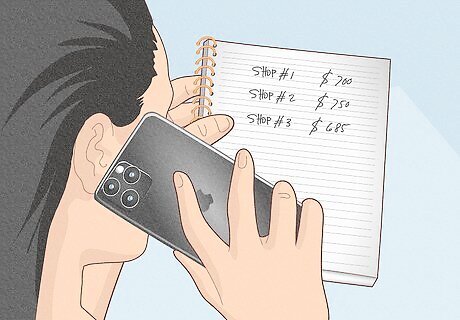
Get at least 3 quotes from buyers on the phone. Tell buyers exactly how much weight you have of each karat of gold and ask for a total payout amount. Be wary of companies that only quote a "price per gram" because they may only be referring to 24-karat gold. Always try to get a price by asking "What will the total payout be when I walk out the door?" If any place won't give you a phone quote with an adequate description of what you have, they’re probably hiding their prices because their payouts are terrible. Do your research before you go to the place that gave you the best phone quote. Check them out on Google, Facebook, and Yelp.
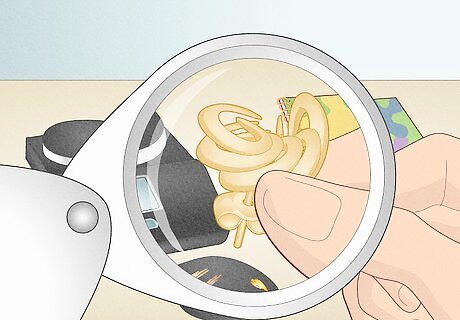
Let your chosen buyer evaluate the piece in person. A gold buyer with a business license must have a physical location, so don’t trust “mobile services” and “gold exchange parties.” Wait for the buyer to make the first offer. If they ask, “How much do you want for this?” say something like, “I’d love to hear your opinion on what it’s worth, given its quality.” Don't let them take your gold to the "back" or out of sight. This shouldn't be necessary and should make you uncomfortable. Ask that your gold is tested in front of you, or find a different buyer. If you leave and their offer goes up by double or triple, DO NOT go back—that’s a classic rip-off strategy. Many places might need to take a sample of your gold before making a formal offer, but make sure they get your permission to take a file to your jewelry if you aren't sure about selling it. If they don’t get your permission before taking a sample of your gold, find a different buyer.
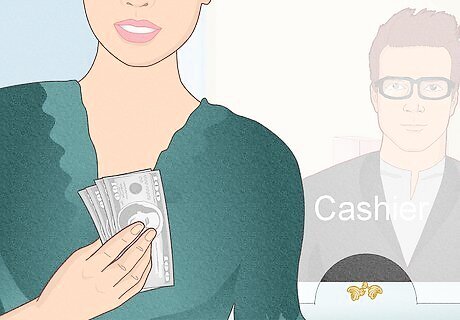
Obtain the required documents to sell your items. Any legitimate gold buyer will require a signature, ID Card, and potentially a thumbprint. These are required so anyone who doesn't do this could be operating illegally, and you should avoid those places. Most places will pay you by check, PayPal, Venmo, Zelle, Cash App, Apple Pay, wire transfer, or cash. Be sure they don’t measure by the pennyweight but pay you by the gram. Be careful walking out of gold stores carrying a lot of cash.




















Comments
0 comment